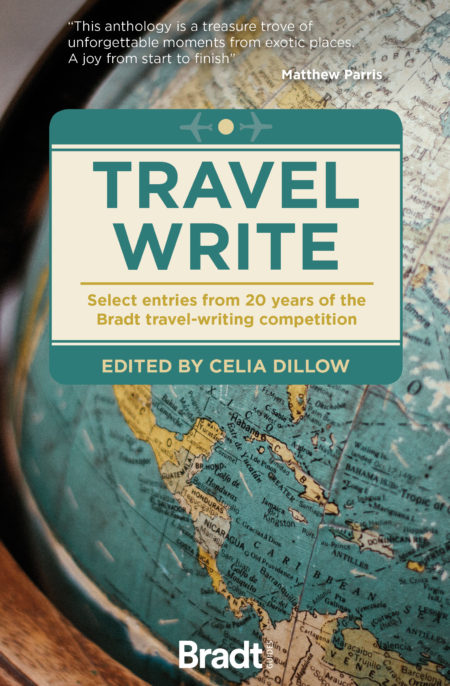We had no idea how cold it was. Our thermometer recorded temperatures to minus thirty but the mercury had slunk well below its bottom-most marker. It was as though the liquid was, like us, hunkering down to conserve every last droplet of heat. At night, we lay close together in our tent in an attempt to benefit from one another’s warmth.
Our sleeping bags contained not just bodies swathed in wool and fleece but the digital cameras, contact lenses and felt boot liners that we wanted to keep from freezing. On our heads we wore balaclavas and hats; each morning we woke to find an outer layer of white ice capped our skulls so that we lay like a line of stiffly swaddled pontiffs. ‘Don’t try to be comfortable,’ said Stefan, our guide. ‘It’s impossible to be comfortable when it’s this cold. The best you can hope for is a couple of hours’ sleep.’
The dogs, like the mercury, were shrinking fast. There were seven of us and thirty-four of them; we were sledding along a part of the Yukon Quest trail that stretches for a thousand inhospitable miles between Fairbanks, Alaska and Whitehorse in Canada’s Yukon Territory. We fed them snacks almost hourly – frozen hunks of fish, chunks of pork and chicken skins – but they were burning calories so fast they devoured them in a gulp, and still they grew skinnier.
In the evenings we dressed the dogs in padded coats; during the day we strapped fabric booties to their feet so the ice wouldn’t cut their paws. We fitted the booties with bare hands – it’s difficult to pull tight the Velcro that binds them when wearing gloves – and we ran to warm our fingers by the fire when the pain grew too searing. We were in no danger of being comfortable.
But then, each morning, after we’d been up for an hour or two melting snow for water, feeding the dogs, eating breakfast and dismantling our camp – the sun climbed above the pristine hilltops. The sky shifted in hue from pale cornflower to a deep, vibrant blue. And the temperatures, gloriously, rose. Now we could look forward to eight hours of undiluted joy.
On the fourth morning we ascended high into the hills following the tracks of a lone wolf. As we approached the summit, the trail became buried beneath fresh snow. My team struggled valiantly to bound through the powder but every now and then they lost their footing and plunged into the gulfs on either side of the packed path. For a moment they would disappear, submerged in the whiteness; then they’d leap to their feet, shake the ice from their faces, wag their tails and look round with a bemused expression that asked, What happened there?
By now I was growing to love these creatures and to know each of their characters. Sonar, in the lead, was diligent in the harness but at night she grew cold and miserable, and left her dinner untouched. Her partner, Pelly, was docile, biddable and happy to eat for two. Terro would chew off his booties at every opportunity but, when I came to replace them, he’d gaze at me so adoringly that all was forgiven.
Val was light and lithe with a nasty habit of chewing the lines, while Log worked with an energy that was almost unfathomable. As we crossed frequent patches of glare ice he’d run so hard that he slipped but, even as he rolled on his back and turned to glance at me with horror, his eager legs would still be pumping. And finally there was Alex Large, loving and perpetually thirsty, he liked to snatch mouthfuls of snow as he ran.
We came down from the hills and continued through forests of spruce towards the Stewart River. Every now and then the dogs’ heads would pivot and they’d accelerate wildly, following the scent of a rabbit or a grouse. It was dusk, the air was growing cold once more, and the time was ripe for shadowy thoughts. My mind shifted to the terrible tales I’d heard about moose: when they encounter a dog team they sometimes charge, causing injuries and even death. ‘What should I do if I meet a moose?’ I asked Stefan. ‘Get a gun,’ he said.
As darkness fell we arrived at the river. Small, snow-covered mounds peaked and dipped where, months ago, the freezing pockets of ice had jammed one against another. The moon was full and in its pale-grey light the dogs trotted in perfect rhythm. Just the patter of booties on snow and the gentle creaking of the sled disturbed that very silent world. It was deathly cold out there but I no longer minded for, in this remote wilderness, I had found a bitter heaven.
More information
The above story was taken from Travel Write, an anthology celebrating 20 years of Bradt’s annual travel-writing competition.
About the author
Polly Evans is an award-winning travel journalist and author. She is the author of the Bradt guide to the Yukon (winner of the British Guild of Travel Writers’ award for Best Guidebook), and Northern Lights. She has also written five travel narrative books. She lives in Berkshire with her husband and three sons.
